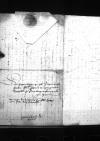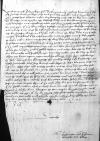Dem Hochwirdigsten ihn God Fursten unnd Herren, / hern ⌊Johanni von Gots gnaden bischoffen zu Ermelanth⌋, / unserm gnedigen herrenn
Hochwirdiger ihn God Furst, gnediger herre /.
Unsere gannz willige ungesparthe dienste somith Ewere Furstlichen Gnaden stetes zuvorahn bereith. /
Gnediger Furst unnd Herre. /
Wihr ubersenden nach Ewer Furstlichen Gnaden gnedigem begeren hir beigelegthe abcopeien unserer beandworthunge, welche wihr vor drey iaren auff des romischen reichs exaction ahn ⌊kaiserliche maiestäth⌋ unnd das ⌊kammergerichte⌋ gethaenn / unnd dieselbigen unns ungeoffeneth widerumb seinth zugeschiketh worden etc. Unnd bedanken unns gegen Ewere Furstlichen Gnaden des gnedigen trostlichen rats so vormergen derselbigen anforderunge und ladunge Ewere Furstlichen Gnaden iungst bey unserm secretario unns haben verstendigen lassen, / welchen wihr den zuvolgen bedacht / unnd diesen unsern diener ahn ⌊konigliche maiestäth⌋, unseren allergnädigsten herrn, abgevertigeth / unnd dweill Ewer Furstlichen Gnaden auch sonst gnedige vertrostunge gethan / unns ihn disen geschefften bey diesem unserm diener mith schrifften bey koniglicher maiestäth forderlich zu sein. /
Haben wihr denselbigenn erstlich auff ⌊Heilsburg⌋ zu Ewerer Furstliche Gnaden zu reithen bevolen / gantz dienstlich bithende Ewer Furstliche Gnaden wollen nach gnediger vertrostunge ⌊unser stad⌋ besten frommen sowoll bey ⌊koniglicher maiestäth⌋ als des hern ⌊canzlers⌋ gnaden helffen vorderen unnd erbithen, / das wihr bey diesem unserm diener widerummb schrifftlich moegen verstendigeth werden. / Was ⌊koenigliche maiestäth⌋ ihn diesem obligenn vor dreien iahrenn gethan / unnd zur ablenunge dieser izigen anforderunge bey ⌊keyserlicher maiestäth⌋ und dem ⌊kamergerichte⌋ thun werde / etc.
Auch ist unser dinstlich bithen gnediglich zu vermerken, das ⌊Joerg Gelewalth⌋, unser bürger, ihn sachen der armen leuthe vom Schonmor / seyner sachen alhie verlustig gworden / und ahn ⌊koniglicher maiestäth⌋ appellierth habe, / aber wihe ehr die sportulas dem gerichte solche abelegen / forderth ehr keine Acta unnd Apostolos unnd leth es also stecken / zum nachteill der armen leuthe / unnd besorgen / unns, ehr werde ethwa bey ⌊koniglicher maiestäth⌋ sich bearbeithen und nach linkischer berichtunge ⌊unserer stad⌋ gerichtenn nachteilig / unnd den armen leuthen schedlich sein. / Welchs zu verhuthen ist unnser dinstlich bithen, / Ewer Furstlichen Gnaden wollen solchs des hern ⌊canzlers⌋ gnaden ihn Ewer Furstlichen Gnaden schrifften meldenn / unnd gnediglich darob sein, / wohe ehr und ⌊Schrother⌋, unser widerparth zu ⌊Krakaw⌋, kemen, / das ihnen ihn ihrem vorgeben kein glaub gegeben werde. / Das wollen wihr gegen Ewer Furstlichen Gnaden, die wihr Gothe lange gsunth empfehlen mith bsondern ernste zu vordienen stetes willig unnd geflissen erfunden werden.

